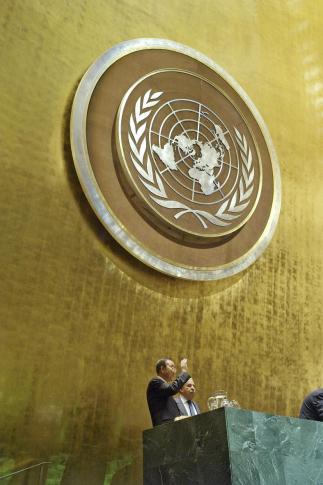
UN General Assembly
Edited to include additional resolutions documented by Access here
What is a United Nations resolution?
United Nations resolutions are formal texts adopted by a UN body, such as the UN General Assembly, the Security Council, or the Human Rights Council.
These resolutions are not legally binding, but can focus world attention on important issues, build international cooperation and sometimes lead to legally binding treaties and conventions.
Which resolutions reference the internet?
The first United Nations resolution to recognise the impact of the internet on human rights, on Freedom of opinion and expression was adopted at the Human Rights Council in October 2009.
The resolution includes recognition of the importance of all forms of the media, including the Internet, in the exercise, promotion and protection of the right to freedom of opinion and expression, calling on States to facilitate equal participation in, access to and use of ICTs, applying a gender perspective.
The resolution also expresses concern about ongoing human rights violations against journalists, writers and other media workers, Internet users and human rights defenders who exercise, seek to promote or defend freedom of opinion and expression, “including extrajudicial killing, arbitrary detention, torture, intimidation, persecution and harassment, threats and acts of violence and of discrimination, including gender-based violence and discrimination, increased abuse of legal provisions on defamation and criminal libel as well as on surveillance, search and seizure, and censorship”
The resolution goes on to express “regret at the promotion by certain media of false images and negative stereotypes of vulnerable individuals or groups of individuals, and at the use of information and communication technologies such as the Internet for purposes contrary to respect for human rights, in particular the perpetration of violence against and exploitation and abuse of women and children, and disseminating racist and xenophobic discourse or content”
Since 2009, the United Nations has increasingly recognised the impact of the internet on a wide range of human rights.
Following the report 2011 on freedom of expression online by the UN Special Rapporteur on freedom of opinion and expression, Frank La Rue, the HRC held the first ever panel discussion on freedom of expression and the internet in early 2012. Since that time, an increasing number of human rights bodies and special mandate holders have examined the impact of the internet on human rights set out by the Universal Declaration on Human Rights and related mechanisms.
The increased recognition of the impact of the internet on human rights has led to a number of important UN resolutions.
UN Human Rights Council resolution: The promotion, protection and enjoyment of human rights on the Internet
In July 2012, 85 countries signed a Human Rights Council resolution led by Sweden affirming that the same human rights we have offline apply online. The resolution “[c]alls upon all States to promote and facilitate access to the Internet and international cooperation aimed at the development of media and information and communications facilities in all countries”.
UN Human Rights Council resolutions: The rights to freedom of peaceful assembly and of association
At the 21st and 24th sessions, the Council reminded States of their obligation “to respect and fully protect the rights of all individuals to assemble peacefully and associate freely, online as well as offline”.
UN Human Rights Council resolution: the role of freedom of expression and opinion in women’s empowerment
Recalling resolution 20/8, the Council adopted without vote a resolution calling on States to “promote, respect and ensure women’s exercise of freedom of opinion and expression, both online and offline, including as members of non-governmental organizations and other associations” and “facilitate equal participation in, access to and use of information and communications technology, such as the Internet, applying a gender perspective, and to encourage international cooperation aimed at the development of media and information and communication facilities in all countries”
UN General Assembly resolution: The right to privacy in the digital age
In November 2013, the the Social, Humanitarian and Cultural Committee committee of the UN General Assembly passed a resolution on privacy in the digital age, originally proposed by Brazil and Germany. The resolution emphasises “unlawful or arbitrary surveillance and/or interception of communications, as well as unlawful or arbitrary collection of personal data, as highly intrusive acts, violate the rights to privacy and freedom of expression and may contradict the tenets of a democratic society.”
The resolution asks the UN High Commissioner on Human Rights to present a report on privacy and surveillance of digital communications at the Human Rights Council, as well as to the General Assembly in 2014, where a special session to examine the report and recommendations will be held.
UN General Assembly resolution: Protecting Women Human Rights Defenders
During the same UN General Assembly session in November 2013, a landmark resolution was passed, ‘Protecting Women Human Rights Defenders’, the first UNGA resolution on WHRDs. APC worked with the WHRD-IC to include language on the technology-related violations of human rights including:
“[..] abuses and violence against women, including women human rights defenders, such as online harassment, cyberstalking, violation of privacy, censorship and hacking of e-mail accounts, mobile phones and other electronic devices, with a view to discrediting them and/or inciting other violations and abuses against them, are a growing concern and a manifestation of systemic gender-based discrimination, requiring effective responses compliant with human rights” [UNGA A/C.3/68/L.4]
UN General Assembly resolution 68/163: The safety of journalists and the issue of impunity
Passed in December 2013 at the same UNGA session, this resolution recalls the 20/8 resolution on the promotion, protection and enjoyment of human rights on the internet, and acknowledges _”[..] that journalism is continuously evolving to include inputs from media institutions, private individuals and a range of organizations that seek, receive and impart information and ideas of all kinds, online as well as offline, in the exercise of freedom of opinion and expression, in accordance with article 19 of the International Covenant on Civil and Political Rights, thereby contributing to shape public debate”.
Image by UN Photo.